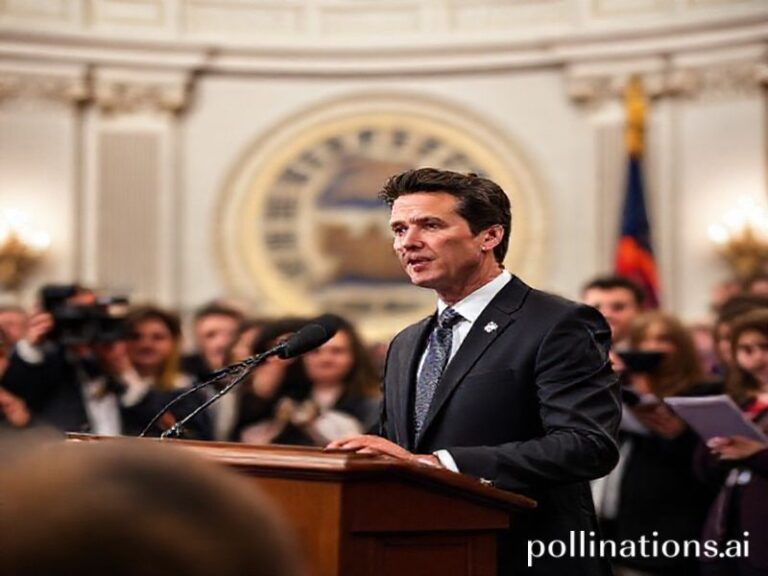10:40 BST: The Tiny Start Time That Briefly Unites the World (Before We All Go Back to Doom-Scrolling)
The Great North Run Starts at 10:40 BST—And the World Holds Its Breath (or at Least Pretends to While Refreshing Twitter)
NEWCASTLE-UPON-TYNE — At precisely 10:40 British Summer Time this Sunday, 60,000 registered humans—plus several hundred opportunistic charity-costumed bananas—will shuffle across the Tyne Bridge in a ritual that looks suspiciously like a mass escape from adult responsibilities. To the initiated, it’s simply the Great North Run, the planet’s largest half-marathon. To the rest of us, it’s a reminder that the global supply chain now includes synthetic wigs, portable urinals, and the collective delusion that 13.1 miles of voluntary suffering is “fun.”
Internationally, the ripple effects begin long before the starter’s horn. In Kenya, altitude-hardened elites wake at 4 a.m. to jog a casual 20K “shake-out,” because nothing says “I’m tapering” like running farther than most people drive to buy groceries. Meanwhile, in Silicon Valley, a boutique fitness startup frantically A/B-tests push notifications promising to “gamify” the Kenyan experience for $39.99 a month—minus the actual altitude, talent, or risk of hyenas.
The start time itself is geopolitical choreography. 10:40 BST translates to 02:40 in Los Angeles, when bleary-eyed expats livestream the BBC feed while spooning cereal into mouths that can’t decide if it’s dinner or breakfast. In Tokyo, it’s 18:40, the perfect slot for salarymen to gather in sports bars, ostensibly to cheer on corporate-sponsored colleagues but mostly to avoid going home and explaining why they missed little Yuki’s piano recital. Again.
Of course, time zones are merely the appetizer; the main course is money. The Run injects £43 million into the northeast economy, roughly the annual GDP of a small Pacific island nation that still thinks TikTok is a breath-mint brand. Hotels triple their prices, pubs extend licensing hours, and local Uber drivers begin practicing phrases like, “Yes, I can absolutely take you to the start line for the low, low cost of your first-born child.” None of this is officially listed in the United Nations Global Human Development Index, but it probably should be.
Security, naturally, is “heightened,” a word that here means “more fences and sniffer dogs than usual, but still not enough to stop a determined seagull.” Police politely remind spectators that backpacks are discouraged, suspicious packages will be exploded in controlled fashion, and anyone wearing a morph-suit will be assumed to be either fundraising or laundering cryptocurrency. Somewhere in Langley, a CIA algorithm flags the whole event as “medium-risk, high-spandex,” just in case the bananas radicalize.
Climate change looms like an uninvited coach with a stopwatch. The Met Office predicts 17°C and overcast—ideal hypothermia weather for runners from Dubai, perfect sauna conditions for Canadians. Organizers boast of eliminating single-use plastics, replacing them with edible seaweed cups that taste, according to one Australian triathlete, “like regret seasoned with low tide.” Still, it’s progress. If the planet must melt, at least it will do so while sipping artisanal algae.
And then there’s the geopolitical subplot nobody discusses: the quiet arms race of national fitness apps. China’s WeRun quietly harvests step data from expats strutting along the Quayside; Strava’s heat map reveals which NATO bases forgot to toggle privacy settings; Russia, ever the contrarian, uploads doctored splits showing a bear in a balaclava clocking 1:03:47. Somewhere in Brussels, a Eurocrat drafts a sternly worded memo about “cardio sovereignty.”
When the gun finally fires at 10:40 BST, the bridge will rumble like a distant Brexit renegotiation. For the next two hours and change, the world will watch, tweet, and donate £5 to someone dressed as a prostate. Then we’ll all return to our respective crises—inflation, wildfires, or that Slack message you still haven’t answered—comforted by the knowledge that somewhere, 60,000 strangers just proved humans can cooperate, provided the finish line includes a foil blanket and a banana that isn’t wearing a costume.
As the last runner crosses, the international media caravan will pack up, leaving behind only discarded gel packets and the lingering question: if we can synchronize global empathy for a Sunday jog, why is everything else still such a goddamn mess?







